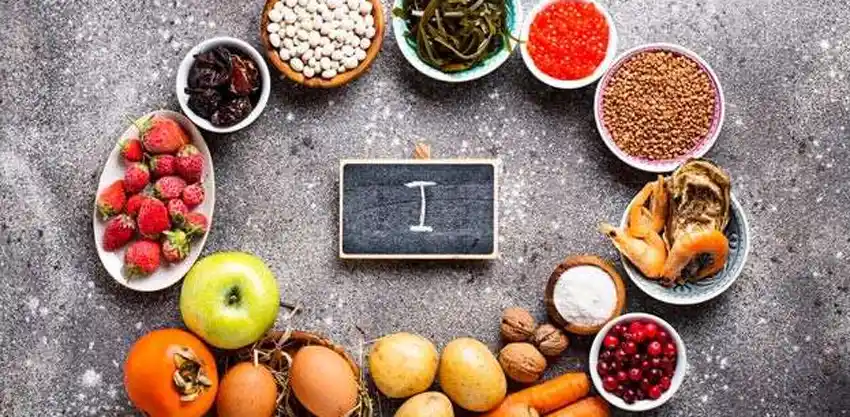Why We Need Iodine
Key points
- Iodine is important for growth, development and health.
- You can get iodine from packaged bread, seafood, eggs, fruit and vegetables, meat and dairy.
- Age, pregnancy and breastfeeding can affect the amount of iodine you need.
- Talk to your GP or dietitian to find out if you and your family are getting enough iodine.
- Iodine, pregnancy and breastfeeding
- Sources of iodine
- How much iodine people need
- Why some people don’t get enough iodine
- Too much iodine
Iodine: what is it?
- Iodine is an essential nutrient for humans. It’s important for growth, development and good health, but we only need a small amount of it.
- Iodine occurs naturally in the sea and in some soils.
- Iodine is also found in marine life (including fish, prawns and seaweed), some plants grown in iodine-rich soil, and in the products of animals that have grazed on soil with iodine in it.
- Iodine is added to some foods, like salt and commercially baked bread.
Why we need iodine
Our thyroid glands need iodine to produce the hormones that control metabolism, growth and development.
If children and grown-ups don’t get enough iodine in their diets, they might develop iodine deficiency. This can cause the thyroid gland to increase in size. An enlarged thyroid gland, or goiter, can:
- Affect hormone production
- Cause swallowing and breathing difficulties
- Lead to hypothyroidism, which can cause problems like weight gain, dry skin, Hair loss, tiredness, intolerance to cold and depression
- Result in stunted growth and intellectual impairment.
Iodine, pregnancy and breastfeeding
During pregnancy, a woman’s thyroid gland has to work extra hard. This is because the hormones it produces help the growth of her unborn baby’s brain and nervous system. Because a pregnant woman’s thyroid gland is working harder, she needs extra iodine so she doesn’t become iodine deficient. Severe iodine deficiency in a pregnant woman might lead to miscarriage, stillbirth or intellectual disability in her baby.
After birth, breastfed babies depend on breastmilk as a source of iodine, which keeps their brains and nervous systems developing. This means that iodine deficiency in breastfeeding mothers can also be a risk for babies.
If you’re pregnant, trying to become pregnant, or breastfeeding, it’s recommended that you take an iodine supplement of 150 micrograms (μg) per day. If you have any pre-existing thyroid problems, check with your doctor before taking a supplement.
Sources of iodine
Including the following foods in your family’s diet each week will help to ensure that you and your children are getting enough iodine:
- Packaged bread: note that organic bread, salt-free bread, unpackaged bread, and bread mixes for making bread at home might not contain iodine, so either check the food label or ask at the point of sale.
- Seafood: experts recommend 2-3 meals of seafood per week. If you’re pregnant, you should be careful when choosing fish. Some fish – like flake, swordfish and tuna – have higher levels of mercury than others. Tinned salmon and seaweed are the best food sources of iodine.
- Eggs, vegetables, meat and dairy products: note that the amount of iodine in these foods varies.
Vegans might need to consider iodine supplements or iodine-rich vegan foods like fortified soy milks and seaweed.
Iodized salt is a rich source of iodine and has replaced non-iodized salt in all packaged breads sold in Australia. Bread fortified with iodized salt can provide enough iodine for most people, without the need for extra iodized salt in your diet. Too much salt isn’t good for your health, so it’s best to get iodine from other sources.
How much iodine people need
The Nutrient Reference Values for Australia and New Zealand recommend the following intake of iodine:
- Young babies aged 0-6 months need 90 μg per day.
- Older babies aged 7-12 months need 110 μg per day.
- Children aged 1-8 years need 90 μg per day.
- Children aged 9-13 years need 120 μg per day.
- Teenagers aged 14-18 years and adults who are neither pregnant nor breastfeeding need 150 μg per day.
- Pregnant women and women trying to get pregnant need 220 μg per day.
- Breastfeeding women need 270 μg per day.
Why some people don’t get enough iodine
Some Australian children – especially those in Victoria, Tasmania and New South Wales – don’t get quite enough iodine.
This might be because several areas of Australia have low iodine levels in the soil, meaning vegetables grown in these areas don’t have much iodine.
Many families now cut salt out of their diets, leading to lower iodine intake. Even when they add salt to their meals, it’s often in the form of regular salt or sea salt, rather than iodized table salt.
Too much iodine
It’s possible to have too much iodine, but consuming a dangerously high level of it is actually quite hard. For example, your child would need to eat 1 kg of cheese or 25 whole boiled eggs or drink 5 glasses of milk in one sitting to have too much.
Some medications and supplements might also contain high doses of iodine.
Some people are particularly sensitive to too much iodine, which might cause difficulties with their thyroid glands.
